
The Bab's shrine
Mt Carmel, Israel
“Ye
are the fruit of one tree and the leaves of one branch. So powerful is
unity’s light that it can illumine the whole world.”
Baha’u’llah
An offshoot of Shi’a Islam that developed into a religion followed by a group of people known as the Babis arose in Persia in the early 19th century. In a time of messianic expectations their leader, Mirza ‘Ali Muhammad, proclaimed himself the gateway (‘Bab’) to the hidden Iman prophesied in Shi’ite belief. An eloquent speaker and zealous reformer, Mirza ‘Ali had soon gathered a band of enthusiasts and the movement spread throughout the country. This inevitably provoked alarm amongst the orthodox and Mirza ‘Ali was executed in 1850 CE.
Mirza Husayn ‘Ali, (who would later assume the title of Baha’u’llah, ‘Glory of God’), was the eldest son of a wealthy Tehran family. When the Bab declared his mission in 1844, Baha’u’llah was 27 years old. He soon became recognized as one of the most powerful and fearless of the Babis.
In 1852, one of the Bab’s followers attempted to kill the Persian Shah as revenge for Mirza ‘Ali; he was immediately put to death, and other Babis were thrown into prison or killed.

Ridvan garden, Akka
After several years in Turkey, Baha’u’llah was exiled yet again, to the prison city of Akka in Palestine. When followers continued to arrive to hear his teachings he was eventually released from prison. He spent the last years of his life in a mansion outside the city, where he continued to receive the pilgrims that flocked to his side. He died in 1892 CE.
One of those imprisoned was Mirza Husayn ‘Ali. It was while he was in prison that he had a vision in a dream. “Verily, we shall render thee victorious by thyself and by thy pen,” he heard. “Grieve thou not...” He was also assured that others would be sent to aid him. Baha’u’llah’s imprisonment lasted for months, and when it was finally determined that he had had no part in the assassination attempt, he was exiled to Iraq.
About a year after arriving in Bagdad Baha’u’llah retired to the wilderness, where he spent a further two years in contemplation and retreat. On his return, he began to spread his message of unity. Jews, Christians and Zoroastrians—as well as Muslims—became interested in his teachings, but certain Muslim mullahs, finding him a threat, petitioned for his further banishment. Eventually he was summoned to Constantinople by the Turkish government (who were in collaboration with the Shah). As Baha’u’llah and his family prepared to depart, his desperate followers besieged his house and he was forced to withdraw to a local park.
It was during this time (21 April to 2 May 1863) that he announced that he was the one whose coming had been foretold by the Bab. The garden where this declaration took place became known to Baha’is as Ridvan* (‘paradise’), and the feast of Ridvan, held annually on the anniversary of those twelve days, commemorates this time.
*The Ridvan garden pictured at left is in Akka, Palestine, where Baha’u’llah died in 1892.

The Earth as seen from lunar orbit,
Apollo 8, December 1968
“The
Earth was small, light blue, and so touchingly alone,
our home that must be defended like a holy relic.”
- Aleksei Leonov, cosmonaut, USSR
Baha’u’llah taught that there is one God whose successive revelations to humanity have been the chief civilizing force in history; and that the common purpose of all founders of religion has been to bring the human race to spiritual and moral maturity.
The
principles which his followers—the Baha’is—promote as
vital to the achievement of the goal of a peaceful, global society include:
abandonment of all forms of prejudice; assurance to women of full equality
of opportunity with men; recognition of the unity and relativity of religious
truth; elimination of extremes of poverty and wealth; the realization
of universal education; the responsibility of each person to independently
search for truth; the establishment of a world federation; and the recognition
that true religion is in harmony with reason and the pursuit of scientific
knowledge.
In
spite of appearing to be in conflict with religion, science has indeed
contributed to the creation of a global spirituality. Nothing has connected
the people of this planet more than the internet, which allows each and
every one of us—if, that is, we have access to the technology—to
explore distant cultures and unfamiliar beliefs. (While I was preparing
this article, I sent an email to the Chinese artist He Qi requesting his
permission to reproduce some of his beautiful paintings. He must have
been on-line at the time, because his assent and his blessings reached
me in what appeared to be a matter of seconds; “it’s a small
world”, had never seemed so true.)
The first pictures of Earth from deep space were taken by the crew of the Apollo 8 mission in December 1968; no other image has so contributed to a sense of ‘one world’ as the picture to the left. Baha’u’llah was not the first person to recognise the essential unity of all expressions of spirituality, but perhaps the Baha’i religion is unique in making that assertion an established principle of the faith.